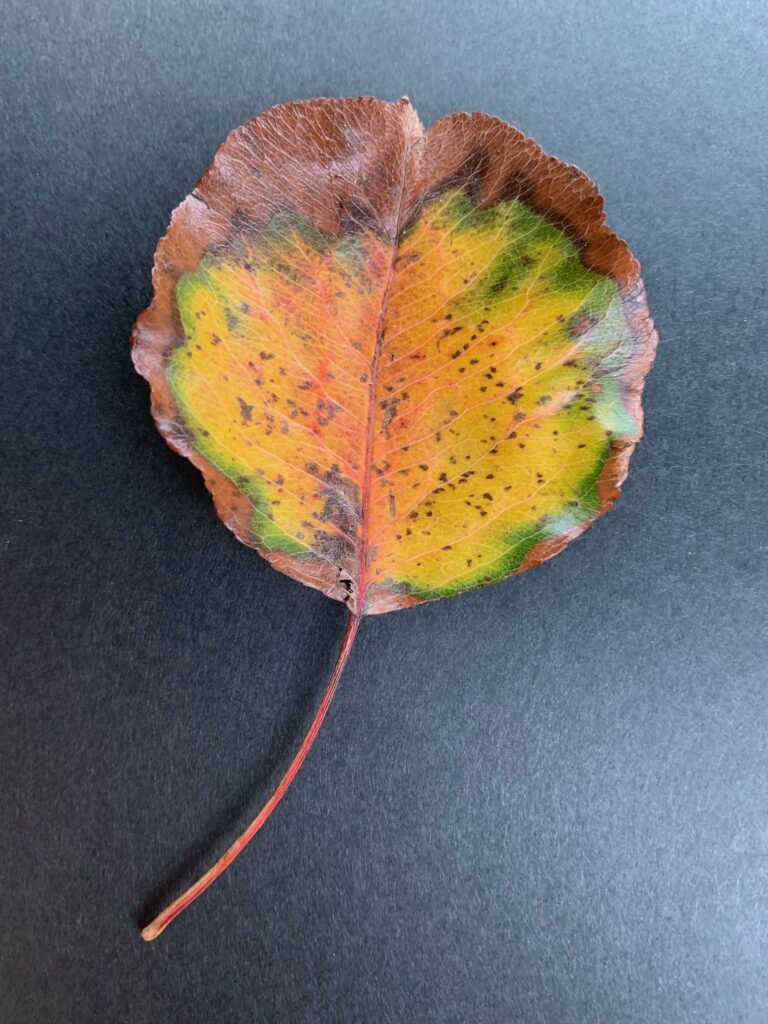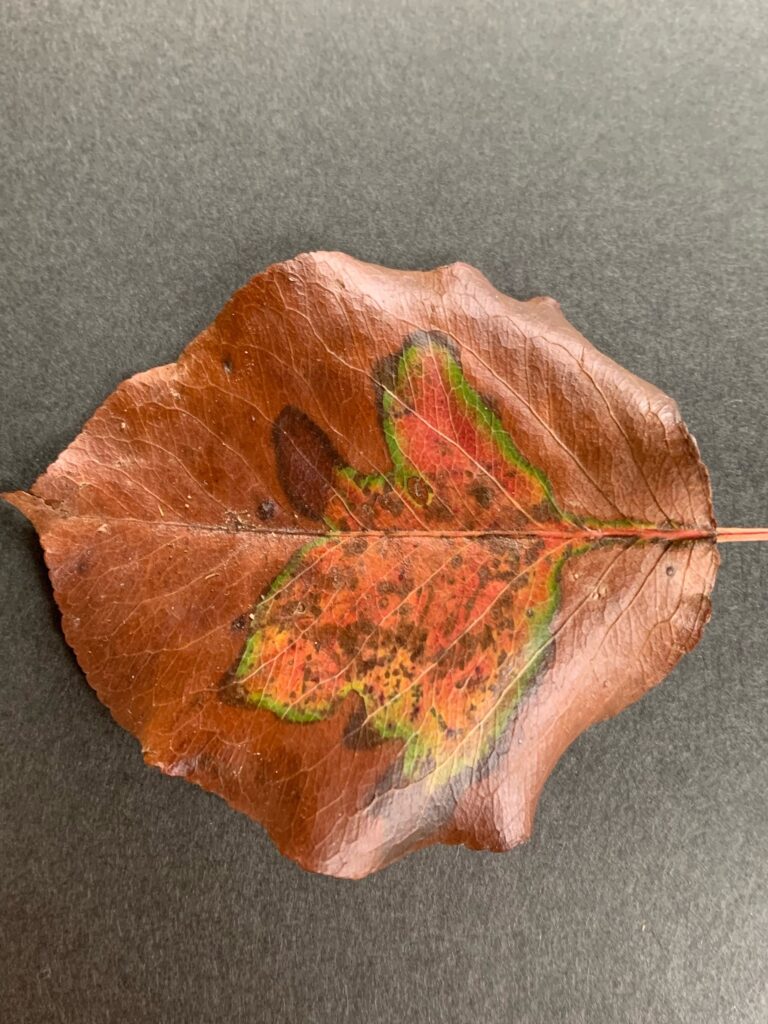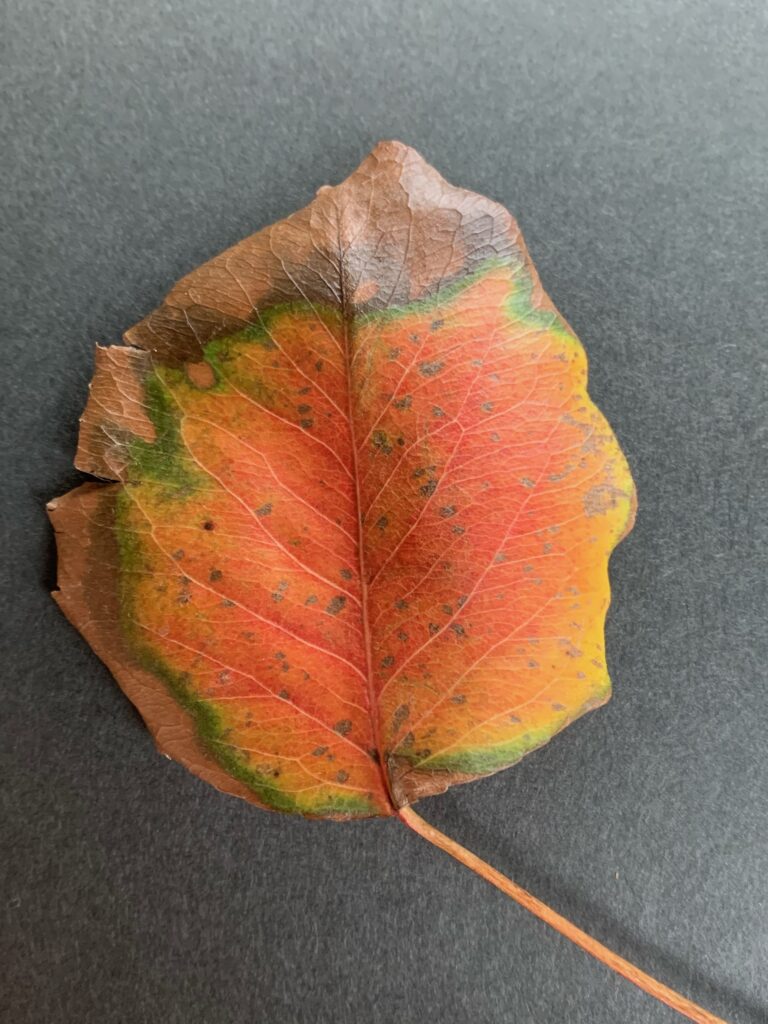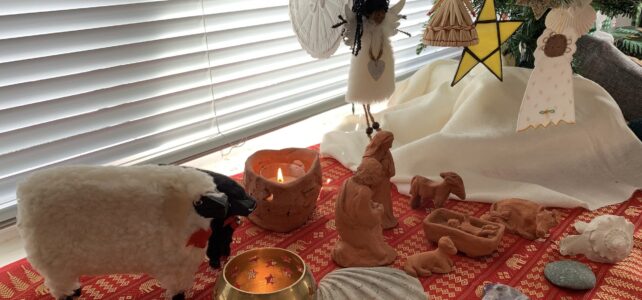Decades ago, I read an article about keeping a “spiritual journal.” I was already a dedicated journaler, having begun in earnest while in high school and was writing occasional guest columns on meeting God in everyday life. Keeping a “spiritual journal” had never occurred to me. I tried the practice for a month or so but found it difficult to decide what to put into my regular journal and what to write in the “spiritual” one. Before long I abandoned the effort. Clearly, for me, the sacred was part of the ordinary. Everything, in its own way was spiritual.
A quote that came to mind all those years ago was Pierre Teilhard de Chardin’s words, “By virtue of Creation, and still more the Incarnation, nothing here below is profane for those who know how to see.”1 The spiritual journal landed in a bin with older journals, never to be used again.
As I think about that today, I’m reminded of John Muir’s words, “When you try to pick out anything by itself, we find it hitched to everything else in the universe.”2 That pretty much expresses my experience of the Divine. There is no separating it out. It is deeply entwined in all things, you, me, and everything else, what we see around us and everything in the cosmos, far beyond even the amazing “vision” of the James Webb Space Telescope (JWST). That’s the first incarnation, the ongoing incarnation: God’s outpouring of Love, of Divine Self, and wrapping it up in matter.
So, as Christmas, the great feast of the Incarnation, draws close, I ponder not only that Jesus somehow held the entirety of God in human form, in human time and space, but also that the Divine is present in all creation and always has been. It’s impossible even to imagine, as God proclaims in Is 55:8-9:
For my thoughts are not your thoughts,
neither are your ways my ways, declares the Lord.
For as the heavens are higher than the earth,
so are my ways higher than your ways
and my thoughts than your thoughts.
Madeleine L’Engle called the Incarnation in Jesus The Glorious Impossible, the title of her book inspired by Giotto’s frescoes. She once wrote that for a period of time, she found the best theology in the writings not of theologians, but of mathematicians and physicists. I’m not reading that exactly, but I am reading Ways of Being: Animals, Plants, Machines: The Search for a Planetary Intelligence by James Bridle. It stretches my mind to consider the“beyond-human world.”
What incredible diversity exists on this earth! How everything continues to change and new things emerge! As I read, I become aware that despite the increase in human knowledge, how little we know about the creatures and plants and beings with whom we share this planet and how interdependent we are. Ways of Being has awakened in me a sense of wonder at the inner life of plants and animals. About different forms of intelligence and the importance of respecting it.
Nature itself feeds my wondering. While on a walk, some small leaves caught my eye. (The woman who tends an amazing garden down the street identified them as Bradford Pear leaves.) Brown, they each held colors and shapes near their centers that brought to mind images from the JWST. At my feet, leaves seemed to hold the universe. I was reminded of lines from a poem by William Blake: To see a World in a Grain of Sand / And Heaven in a Wild Flower / Hold Infinity in the palm of your hand



Some passages in Bridle’s book touch my belief in and experience of the inherent spirituality of all things; some accounts address this directly, as in the case of primatologist Barbara Smuts, who described her experience with a troop of baboons as something like the experience of mystics. Living with the baboons, she felt a shift in her sense of identity from simple individuality to being a part of something much larger than herself. She also described an experience with a troop of baboons who, while traveling, stopped at a small pool and “…Without any obvious signal, each of the baboons sat down on a smooth stone surrounding the pool, and for half an hour (by human reckoning) they sat alone or in small clusters, completely quiet, staring at the water. Even normally boisterous juveniles slipped into quiet contemplation.”3
This occurred in the same area where Jane Goodall studied chimpanzees. She witnessed something that also hints at the “inner life” of the animals. On numerous occasions and locations, she observed an adult chimpanzee (different animals, but usually male) stand in front of an impressive waterfall, hair erect, preforming a “magnificent display” at the foot of the falls: “He always sways rhythmically from foot to foot, stamping in the shallow, rushing water, picking up and hurling great rocks. Sometimes he climbs up slender vines that hang down from the trees high above and swing out into the spray of the falling water.”4 Goodall considered these displays “precursors of religious ritual.” This may be may be imposing a “human world” perspective on chimpanzee behavior, but it gave me pause.
How little we know about God’s presence in creation! Bridle reflects on a presentation by theoretical physicist, Karen Barad on quantum physics. He writes, “Barad’s talk also left me with another impression: That science’s greatest advances arrive not as settlements or conclusions, but as revelations of a still-deeper complexity. This complexity exceeds our mastery and comprehension – but is still relatable, still livable, still communicable and actionable. Science, it struck me then, is a guide to thinking, not a thought: an endless process of becoming.”5
I scribbled in the margins, “Sounds like spirituality to me.”
And so, along with the lectionary and Mary Oliver, Ways of Being has been part of my Advent reading. I need lots of time but, as when doing Lectio Divina, I’m not in a hurry. It is slow, deep reading, letting the mystery sink into my bones.
This holiday, we celebrate two things. The first is the Incarnation of the Divine in Jesus, who showed us what it looks like when a human being lives in complete union with the Divine within. Of course, the unique bit of Divinity that dwells within each of us is not the entirety of God enfleshed in Jesus, but still, in Jesus, we see faithfulness to what we are all called to do: cooperate with the gift of God’s Self given to enliven us and to share. The second thing to celebrate is the incarnation of Divinity at the heart of creation, of time and space. God’s outpouring of self, creating a cosmos beyond our comprehension. Other beings perhaps (I believe so) who reflect a different bit of God into the universe. Into other universes. Other realities. How many billions of galaxies has JWST revealed? How many ways has/is God-life expressed in matter?
The Incarnation is not only something to celebrate, but also something to live—In our ordinary, everyday routines. In our work. In doing what we love. In how we interact with others. In how we interact with the environment. In every little thing. It is our call. Our vocation. Our actions contribute to the ongoing, wondrous reality of God-with-Us. And with all that is.
Notes
- Teilhard de Chardin, The Divine Milieu. In my 1968 edition, the quote is found on page 66. It is in Part One: The Divinisation of Our Activities, Section 5 A. Finding the quote in context led to me reading the chapter and putting the old book along with others on my shelf to read again in 2023!
- John Muir, My First Summer in the Sierra (Boston: Houghton Mifflin. 1911).
- Barbara Smuts as quoted in James Bridle Ways of Being: Animals, Plants, Machines: The Search for Planetary Intelligence, (New York: Farrar, Straus, Giroux, 2022), pp. 54-55.
- Jane Goodall as quoted in James Bridle Ways of Being: Animals, Plants, Machines: The Search for Planetary Intelligence, (New York: Farrar, Straus, Giroux, 2022), p. 56.
- James Bridle, Ways of Being: Animals, Plants, Machines: The Search for Planetary Intelligence, (New York: Farrar, Straus, Giroux, 2022), p. 86
Sources:
Pierre Teilhard de Chardin, The Divine Milieu
James Bridle, Ways of Being: Animals, Plants, Machines: The Search for Planetary Intelligence
